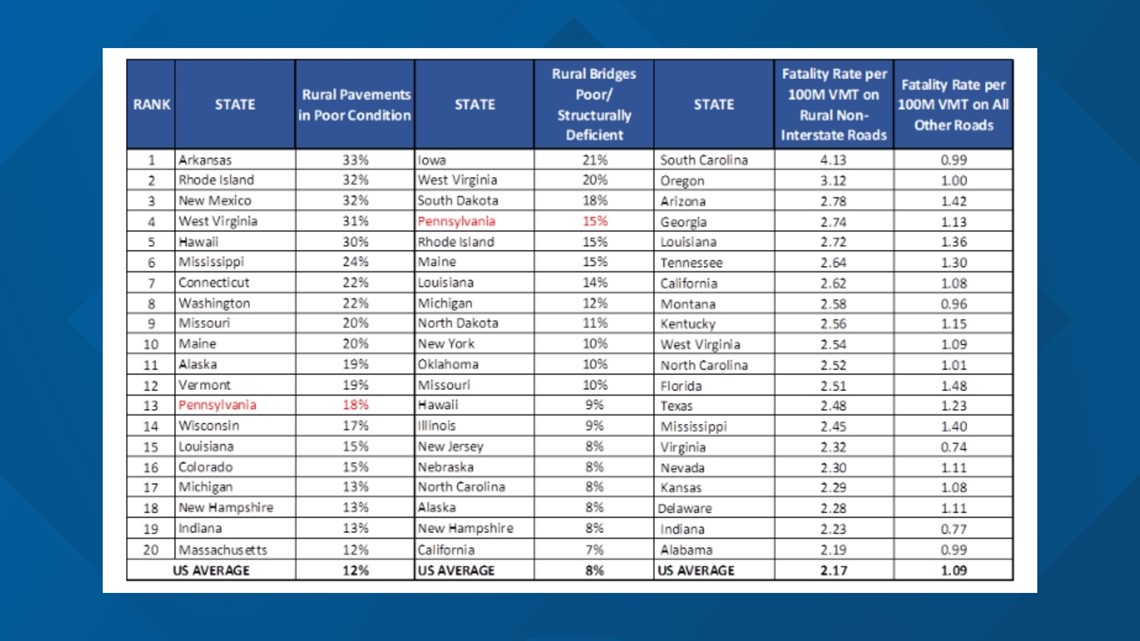PENNSYLVANIA, USA — A report released Wednesday by TRIP, a national transportation research nonprofit, found that Pennsylvania's rural roads and bridges are among some of the most deteriorated in the country.
The report, "Rural Connections: Examining the Safety, Connectivity, Condition and Funding Needs of America’s Rural Roads & Bridges," evaluated the safety and condition of these structures and found that "the nation’s rural transportation system is in need of immediate improvements to address deficient roads and bridges, high crash rates, and inadequate connectivity and capacity," according to a release.
The nonprofit states in the release that roads, highways, rails, and bridges in the United States' rural areas face a number of significant challenges, including: the lack of adequate capacity, the failure to provide needed levels of connectivity to many communities, and the lack of support for growing freight travel in many corridors.
"Rural roads and bridges have significant deficiencies and deterioration, they lack many desirable safety features, and rural non-Interstate roads experience fatal traffic crashes at a rate far higher than all other roads and highways," a statement reads."
Of the top 20 states ranked in the report with the most deteriorated infrastructure, Pennsylvania ranked 13th. Below, you can find a chart detailing the findings:


The report found that 15% of Pennsylvania's rural bridges are rated in poor or structurally-deficient condition, which is the fourth highest rate in the country. These bridges have significant deterioration to the major components of the bridge and frequently are posted for lower weight or closed traffic, restricting or redirecting large vehicles, including agricultural equipment, commercial trucks, school buses, and emergency services vehicles, the report states.
Similarly, 18% of the Commonwealth's rural roads are in "poor condition," and 20% are in "mediocre condition."
Also according to the report, the rate of traffic fatalities on the state's rural roads is nearly double the rate on all other roads in the state at 2.02 fatalities per 100 million vehicle miles of travel. Just in 2020, there were 442 fatalities on Pa.'s rural roads, as well.
“Pennsylvania farmers know far too well how structurally-deficient roads and bridges increase their costs and harm the efficiency of their operations,” Rick Ebert, president of the Pennsylvania Farm Bureau, said in a statement. “The communities in which our members work and live need a smoothly functioning transportation system to connect with both local and global markets. Delays caused by the need to avoid substandard bridges and roads are even more detrimental in the current economic environment. The TRIP report illustrates the challenges that remain for Pennsylvania policymakers to improve the Commonwealth’s critical rural transportation network.”
As noted by TRIP, there is legislation in motion to try to remedy some of these issues.
In Nov. 2021, the Infrastructure Investment and Jobs Act (IIJA) was signed into law, and the release states that this "will provide a significant boost in federal investment in roads, bridges, and transit and offers an opportunity for the nation to make progress in improving the safety, reliability, and condition of America’s transportation system."
IIJA includes a $2 billion Rural Surface Transportation Grant Program that "will support projects to improve and expand the surface transportation infrastructure in rural areas to increase connectivity, improve the safety and reliability of the movement of people and freight, and generate regional economic growth and improve quality of life," the release states.
“Farmers and ranchers depend on rural roads, highways, and bridges to bring critical inputs like fertilizer and feed onto the farm and to move their products to market,” Zippy Duvall, president of the American Farm Bureau Federation, said in a statement. “As recent supply chain challenges have highlighted, transportation delays and costs take a bite out of our profitability and competitiveness and impact the quality of rural life. Enactment of the IIJA will provide a significant boost to federal investment in roads and bridges and offers an opportunity to improve the safety, reliability, and condition of America’s transportation system.”



